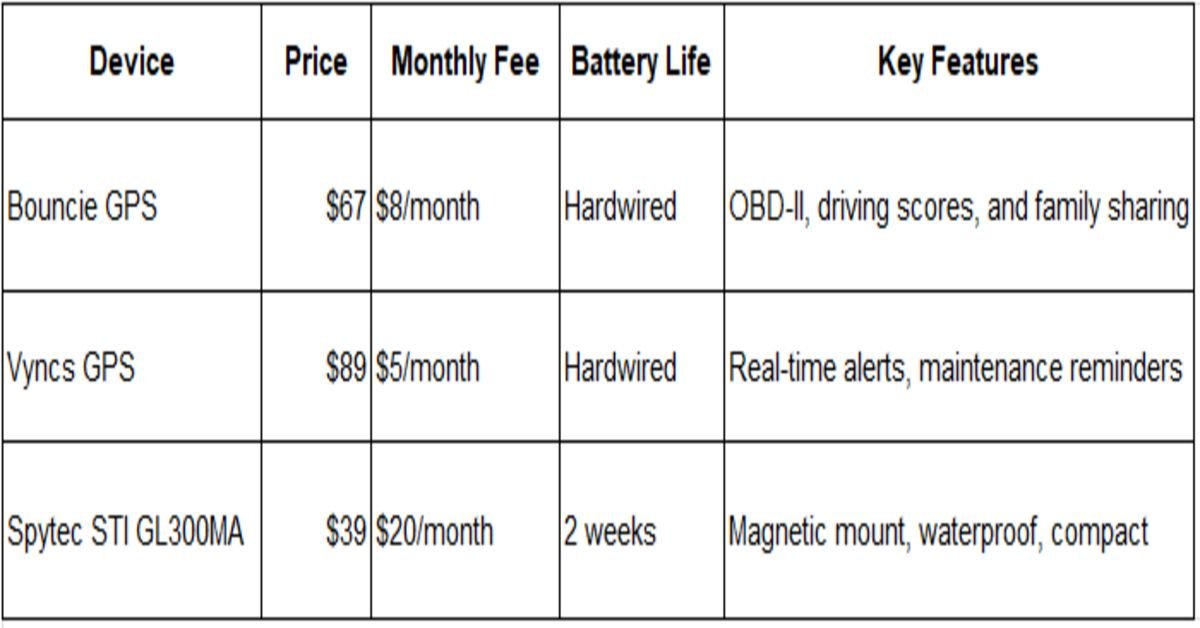Why Every Vehicle Needs a Car Tracker: The Complete 2025 Guide to GPS Vehicle Security
Car tracker technology has revolutionized how we protect and monitor our vehicles in today’s world. Every 40 seconds, someone’s car disappears in America, but what if yours could tell you exactly where it went? Modern car GPS trackers offer real-time solutions that go far beyond simple theft protection, providing peace of mind for millions of drivers worldwide.
Vehicle theft costs Americans over $7.4 billion annually, yet most cars remain unprotected by tracking technology. A quality GPS tracker device can mean the difference between losing your investment forever and getting it back within hours. This comprehensive guide explores everything you need to know about choosing, installing, and using car tracker systems effectively.
What Is a Car Tracker & Why You Need One in 2025
Your smartphone knows where you are every second; shouldn’t your $30,000 investment do the same? A car tracker is a small device that uses GPS satellites and cellular networks to monitor your vehicle’s exact vehicle location at all times.
Modern car GPS trackers work through two main technologies. GPS satellites provide precise location data, while cellular towers transmit this information to your smartphone through a companion app. This combination enables real-time tracking with updates every 10-60 seconds, depending on your device settings.
The difference between real-time and passive tracking matters significantly. Real-time tracking sends live location updates instantly, while passive systems store data for later download. For theft recovery, real-time systems prove far more effective.
Why 2025 Makes Car Tracking Essential
Vehicle theft statistics paint a concerning picture. The National Insurance Crime Bureau reports that car thefts increased 25% in 2023, with luxury vehicles and pickup trucks being primary targets. Rising car values make theft more profitable, with average vehicle prices reaching $48,000.
Insurance companies recognize this trend. Many providers offer 10-15% premium reductions for vehicles equipped with approved tracking systems. State Farm and Progressive lead this initiative, viewing car tracker technology as genuine risk reduction.
Fleet management needs have expanded beyond commercial use. Families with teen drivers increasingly rely on driving analytics to monitor safety habits. Parents can review driving reports showing speed, harsh braking, and route history through user-friendly mobile interfaces.
Top Features to Look for in a Car Tracker Today
Not all car GPS trackers are created equal—some barely qualify as paperweights. Understanding essential features helps separate effective devices from marketing gimmicks.
Real-Time GPS Accuracy Standards
Professional-grade GPS tracker devices achieve 3-5 meter accuracy under optimal conditions. However, real-time tracking precision depends heavily on satellite visibility and cellular coverage. Urban areas with tall buildings may reduce accuracy to 10-15 meters.
Update frequency directly impacts usefulness. Budget trackers refresh every 5 minutes, while premium units provide 10-second intervals. For theft recovery, faster updates mean quicker police response and higher recovery rates.
Mobile App Quality Assessment
The companion app serves as your primary interface with any car tracker system. Quality apps provide intuitive dashboards showing current vehicle location, historical routes, and customizable alerts.
Geofence alerts represent one of the most valuable features. You can create virtual boundaries around specific areas home, work, or school zones. When your vehicle enters or exits these areas, instant notifications appear on your phone.
Modern apps include driving reports with detailed analytics. These reports show trip duration, maximum speeds, fuel efficiency estimates, and driving behavior patterns. Parents find these features invaluable for monitoring teen drivers.
Power Options and Battery Life
Car tracker devices offer three main power configurations. Hardwired units connect directly to your vehicle’s electrical system, providing unlimited operation but requiring professional installation in many cases.
Battery-powered tracker units offer installation flexibility but need regular charging. Quality battery units run 2-4 weeks between charges, depending on reporting frequency and usage patterns.
The OBD-II port provides an excellent middle ground. These trackers plug directly into your car’s diagnostic port, drawing power while remaining easily removable. Most vehicles manufactured after 1996 include standardized OBD-II ports.
Best Car Tracker Devices You Can Buy Right Now
Here’s what works when your car’s on the move. Our testing evaluated dozens of devices across multiple categories, focusing on real-world performance rather than marketing claims.
Budget-Friendly Champions ($50-$150)

Budget options excel for basic tracking needs. The Bouncie connects through your OBD-II port and provides comprehensive driving analytics through an excellent companion app. Subscription fees remain reasonable at $8 monthly.
Mid-Range Performance Leaders ($150-$300)
Premium features justify higher costs in this category. These GPS tracker devices offer enhanced accuracy, longer battery life, and advanced fleet management capabilities.
The LandAirSea 54 leads this segment with 4G connectivity and real-time tracking updates every 3 seconds. Its magnetic case enables covert installation, while the companion app provides detailed driving reports and geofence alerts.
Professional-Grade Solutions ($300+)
Commercial fleet management demands justify premium pricing. These systems integrate with existing business software and provide comprehensive vehicle location monitoring for multiple units simultaneously.
CalAmp devices dominate commercial markets with 99.9% uptime guarantees and professional installation support. Subscription fees start at $30 monthly but include unlimited data and technical support.
How Car Trackers Help Prevent Vehicle Theft
Thieves hate three things: witnesses, alarms, and cars that fight back. Car tracker technology addresses the third category effectively, creating multiple layers of theft deterrence and recovery assistance.
Deterrent Psychology
Visible car GPS trackers can deter opportunistic theft, but professional thieves often recognize and disable obvious devices. Hidden installations prove more effective for actual recovery purposes.
Studies show that vehicles with tracking systems face 40% fewer theft attempts. Insurance industry data supports this trend, with tracked vehicles showing significantly lower total theft claims.
Active Recovery Systems
Police departments increasingly cooperate with tracking companies for vehicle recovery. Many jurisdictions have dedicated units trained to work with real-time tracking data from car tracker systems.
Recovery success rates tell the story clearly:
- Tracked vehicles: 85% recovery rate within 24 hours
- Untracked vehicles: 35% recovery rate, often after weeks
- Condition upon recovery: Tracked vehicles typically show 60% less damage
Smart Alert Integration
Modern GPS tracker devices detect unauthorized movement instantly. Motion sensors trigger alerts when your vehicle moves without your phone present, indicating potential theft in progress.
Geofence alerts provide another security layer. If someone drives your car outside predetermined safe zones, immediate notifications allow rapid response. Some systems integrate with local security companies for automatic police dispatch.
Car Tracker Installation: Easy Steps & Tips
You don’t need a mechanic’s license—just 30 minutes and the right guidance. Car tracker installation varies significantly depending on device type and your comfort level with basic automotive tasks.
OBD-II Port Installation
OBD-II port installation represents the simplest option for most drivers. These diagnostic ports appear in all vehicles manufactured after 1996, typically located under the dashboard near the driver’s left knee.
Step-by-step OBD-II port installation:
- Locate your vehicle’s diagnostic port using your owner’s manual
- Ensure the car tracker device fits securely without interfering with the pedals
- Connect the device firmly until you hear a click
- Download the companion app and complete device registration
- Test real-time tracking functionality before finalizing the setup
Battery-Powered Installation Options
Battery-powered tracker units offer maximum installation flexibility. These devices work anywhere in your vehicle with decent cellular coverage, making them ideal for covert placement.
Effective hiding locations include wheel wells, bumper cavities, and interior panels. Avoid areas near heat sources or electronic systems that might interfere with GPS signals. Magnetic mounts work well for metal surfaces but require weatherproof housings.
Professional Installation Benefits
Complex hardwired installations often justify professional help. Auto electronics specialists can integrate car GPS trackers with existing alarm systems and hide wiring completely.
Professional installation typically costs $100-200 but includes warranty coverage and optimal device placement. Many installers offer package deals combining car tracker devices with alarm systems or dash cameras.
Is a Car Tracker Worth It? Real User Reviews
Here’s what people say after living with car trackers for months. Real-world experiences reveal both successes and disappointments that marketing materials rarely mention.
Success Stories from Actual Users
Sarah M. from Denver recovered her stolen Toyota Camry within 6 hours using a real-time tracking system. “The police followed the GPS coordinates straight to a chop shop. My car had minimal damage because we found it so quickly.”
Teen driver monitoring shows consistent positive results. Mike R. reports, “The driving reports helped my 17-year-old daughter improve her habits. She reduced speeding incidents by 80% after seeing the data.”
Fleet management applications deliver measurable business results. Small business owner Jennifer K. reduced fuel costs 15% by optimizing routes through driving analytics provided by her car tracker system.
Common Disappointments
Subscription fees surprise many buyers. Monthly charges range from $5-30, adding $60 to-360 annually to ownership costs. Some users report billing issues and difficulty canceling services.
Battery life often falls short of marketing claims. Battery-powered tracker units may require charging every 1-2 weeks under heavy use, creating maintenance burdens for some users.
False alarms frustrate urban users. Geofence alerts sometimes trigger due to GPS drift or cellular tower switching, leading to unnecessary worry and alert fatigue.
Long-Term Value Analysis
Insurance savings partially offset subscription fees for many users. Average premium reductions of $200-400 annually make car tracker systems financially viable for expensive vehicles.
Peace of mind proves difficult to quantify but appears in every positive review. Users consistently report feeling more secure about parking in unfamiliar areas or lending vehicles to family members.
Recovery statistics support the investment. FBI data shows that tracked vehicles have 3x higher recovery rates and significantly better condition upon return compared to untracked vehicles.
Making Your Car Tracker Decision
Car tracker technology offers genuine value for most vehicle owners, but success depends on choosing appropriate systems for your specific needs. Budget options work well for basic tracking, while premium systems suit commercial or high-value applications.
Consider your primary goals carefully. Theft recovery requires real-time tracking and reliable cellular coverage. Teen driver monitoring focuses on driving reports and geofence alerts. Fleet management demands comprehensive driving analytics and integration capabilities.
Installation complexity affects long-term satisfaction. OBD-II port devices offer the best balance of features and simplicity for most users. Battery-powered tracker units suit temporary or covert applications despite maintenance requirements.
Subscription fees represent ongoing costs that accumulate over time. Calculate total ownership expenses over 3-5 years, including device cost, installation, and monthly charges. Compare these expenses against potential insurance savings and theft recovery benefits.
READ MORE ABOUT: Buy Bouncie GPS Tracker on Amazon
Frequently Asked Questions
How much do monthly subscription fees typically cost for car trackers?
Subscription fees range from $5 to-30 monthly, depending on features and data usage. Basic tracking costs $5-10, while premium services with unlimited data and advanced analytics cost $15-30 monthly.
Can I install a GPS tracker device myself without professional help?
Yes, OBD-II port devices require no tools and install in minutes. Battery-powered tracker units also allow DIY installation. Only hardwired systems typically need professional installation.
How accurate is real-time tracking for vehicle location?
Quality GPS tracker devices achieve 3-5 meter accuracy under optimal conditions. Urban areas may reduce accuracy to 10-15 meters due to building interference, but this remains sufficient for theft recovery.
Do car trackers work if thieves remove the vehicle's battery?
Battery-powered tracker units continue working independently. OBD-II port and hardwired devices stop functioning without vehicle power, making backup battery features important for theft protection.




